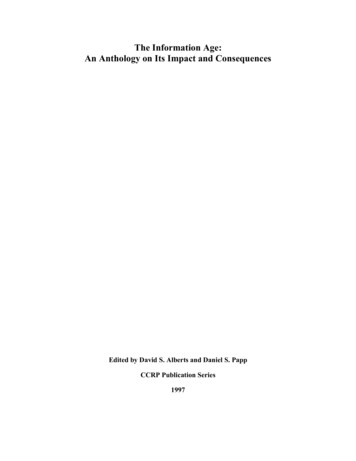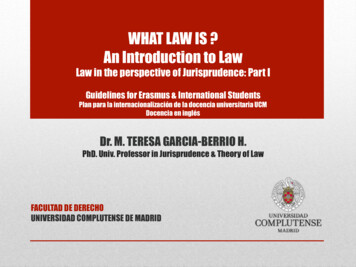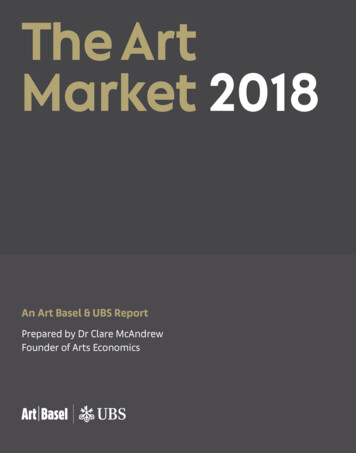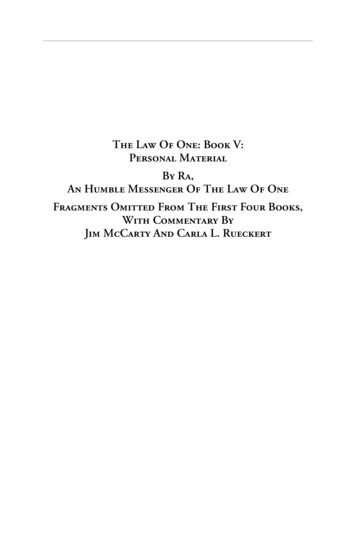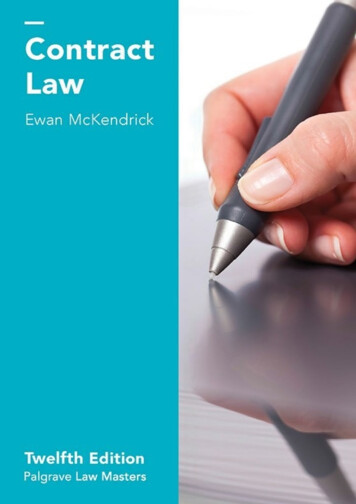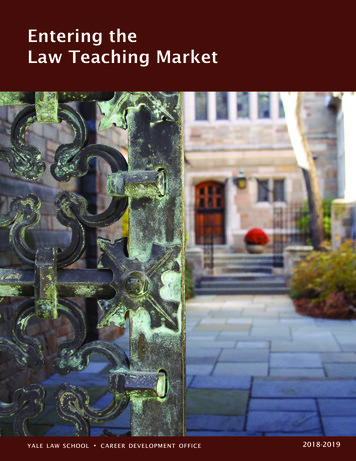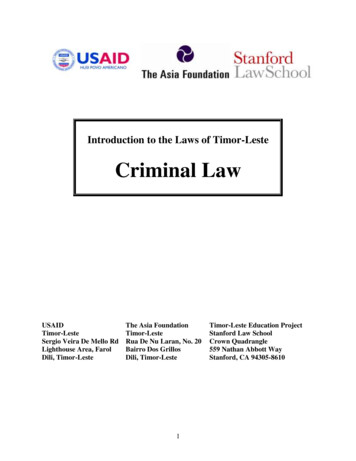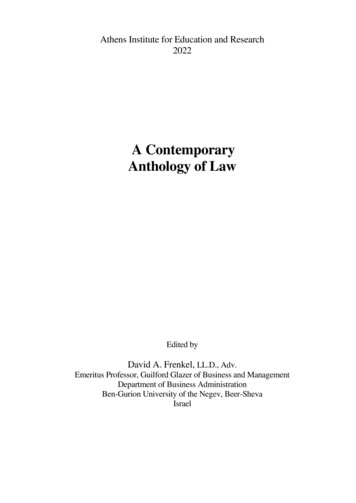
Transcription
Athens Institute for Education and Research2022A ContemporaryAnthology of LawEdited byDavid A. Frenkel, LL.D., Adv.Emeritus Professor, Guilford Glazer of Business and ManagementDepartment of Business AdministrationBen-Gurion University of the Negev, Beer-ShevaIsrael
First Published in Athens, Greece, by theAthens Institute for Education and ResearchISBN: 978-960-598-463-2All rights reserved. No part of this publication may be reproduced, stored in aretrieval system, or transmitted, in any form or by any means, electronic, mechanical, photocopying,recording or otherwise, without the written permission of the publisher,nor be otherwise circulated in any form of binding or cover.Printed and bound in Athens, Greece by ATINER9 Chalkokondili Street1067 Athens, Greecewww.atiner.gr Copyright 2022 by the Athens Institute for Education and Research.The individual essays remain the intellectual properties of the contributors
Table of ContentsList of ContributorsIntroductionDavid A. FrenkelEncountering the Mysteries of Law and LiteratureMichael P. MalloyThe Principle of Proportionality as Control Criterion of thePermissible Restrictions: The Inter-American Court of HumanRights StandardsAngélica María Burga CoronelRussian Legal DiscourseVladimir OrlovPlatform Contracts: Legal Framework and User ProtectionMaria Luisa ChiarellaComputational Econometrics for Litigation Support in EmploymentDiscrimination: The Odds RatioElias C. Grivoyannis & Constantine H. GrivoyannisContractual Unpredictabiliy in the Context of Covid-19 PandemicMihaela Elvira Patraus & Ionita Maria OfrimThe Protection of the Status Filiationis in the Event of SurrogateMotherhoodMarta PicchiLost in Translation: Dogmatic, Methodological and PhilosophicalIssues of Contractual AutomationClaudio SarraThe Legal and Economic Questions posed by the GermanConstitutional Court’s decision in the Public Sector PurchaseProgramme (PSPP) CaseAndrew James PerkinsDuties and Responsibilities Beyond the DecadesŞule Şahin CeylanInsolvency of the Natural Person and COVID 19 in RomaniaLavinia-Olivia IancuCrucial Issues with Legal Protection of Consumers Human Rightswhen Banks unilaterally Close AccountsAleksejs JelisejevsPersonality Rights – A Universal Tool for the Recovery of NonPecuniary LossMartyna KasperskaEncountering Charles Dickens: The Lawyer’s MuseMichael P. Malloy5713213355697799109127141151163181193
List of ContributorsBurga Coronel, Angélica MaríaDr. of Law, Human Rights and Fundamental Freedoms. Professor andresearcher, Faculty of Law, Autonomous University of Baja California,Mexico. Member of the Mexican National Researcher System (SNI). Memberof the Peruvian Association of Constitutional Law. Member of the Bar ofChiclayo, Peru.Email: aburga@uabc.edu.mxChiarella, Maria LuisaAssociate Professor of Private Law, Magna Græcia University, Catanzaro,Italy.Email: mlchiarella@unicz.itFrenkel, David A.LL.D. Emeritus Professor, Guildford Glazer Faculty of Business andManagement Department of Business Administration, Ben Gurion Universityof the Negev, Beer-Sheva, Israel. Fellow, Royal Society of Public Health (UK).Head, Law Unit, Athens Institute of Education and Research (ATINER),Athens, Greece. Member of the Israeli Bar.Emails: dfrenkel@bgu.ac.il; david.frenkel@gmail.comGrivoyannis, Constantine H.M.H.A., M.R.M., M.S. (Taxation). Associate, Forensic Economic Damages,LLC, a Litigation Support firm serving New York metropolitan area. USA.Email: chg57@Cornell.eduGrivoyannis, Elias C.Ph.D., Associate Professor of Economics. Yeshiva University, New York, N.Y.USAEmail: grivoyan@yu.eduIancu, Lavinia-OliviaDr. of Law, Lecturer, Faculty of Economics, Tibiscus University of Timişoara,Romania.Email: relicons@yahoo.comJelisejevs, AleksejsPh.D. Candidate in Law Science, Turība University, Riga, Latvia.Email: aleksejs@jelisejevs.lvKasperska, MartynaPh.D. Candidate, Faculty of Law and Administration, the Doctoral School atthe University of Silesia, University of Silesia in Katowice, Poland.Email: martynakasperska@gmail.com
Malloy, Michael P.J.D.; Ph.D. Distinguished Professor of Law. University of the PacificMcGeorge School of Law, Sacramento, CA, USA. Member of the USSupreme Court Bar, the US District Court for the District of New Jersey Bar,The New Jersey Bar and the American Bar Association. Director, Businessand Law Research Division, Athens Institute for Education and Research(Atiner), Athens, Greece. Member, Real Estate Market Advisory Group, UNCommittee on Urban Development, Housing and Land Management, UNEconomic Commission for Europe.Email: mmalloy@pacific.eduOfrim, Ionita MariaJudge, Zalau Court, Romania.E-mail: ionita.ofrim@gmail.comOrlov, VladimirDr. of Legal Sciences; Professor, Herzen State Pedagogical University ofRussia, Saint Petersburg, Russia; Adjunct Professor, University of Helsinki,Helsinki, Finland.Email: vladimir.orlov@saunalahti.fiPatraus, Mihaela ElviraAssociate Professor, Faculty of Law and jurisprudence, School of Law,University of Oradea, Oradea, Romania.E-mail: mihaelapatraus@yahoo.comPerkins, Andrew JamesSenior Lecturer, Truman Bodden Law School of the Cayman Islands. GeorgeTown, Grand Cayman, Cayman Islands.Email: andrew.perkins@gov.kyPicchi, MartaPh.D. in Public Law; Associate Professor of Public Law, Department of LegalSciences, University of Florence, Florence, Italy.Email: marta.picchi@unifi.itŞahin Ceylan, ŞuleDr. of Law, Assistant professor, Department of Philosophy and Sociology ofLaw, Faculty of Law, Marmara University, Istanbul, TurkeyEmail: sule.s.ceylan@marmara.edu.trSarra, ClaudioPh.D.; prof.dott.avv.; Associate Professor, Department of Private Law andCritique of Law, University of Padova, Padova, ItalyEmail: claudio.sarra@unipd.it
IntroductionDavid A. FrenkelThis book offers a selection of essays which shed light on various issues in thefield of Law. The essays are revised versions based on presentations at the 2021International Conferences on Law organised by the Athens Institute for Educationand Research (ATINER) held in Athens, Greece. The essays in this volume havebeen selected after a process of blind-review on the basis of the reviewers’comments and the essays contribution to the ongoing discussion of the respectiveissues.Despite the pandemic, the meetings were successful, though most of thepapers were online presentations. Lawyers and other scholars who are interested inlaw and legal matters from across the world have proved their willingness to gettogether and discuss and talk about current legal issues.Traditional boundaries have become permeable. We live in a transparent,influenceable and pervious world. The response of the law and the legal systems tocurrent developments including the issues and questions caused and raised by theCovid-19 pandemic is one of the great and serious challenges of our time. Theauthors of the essays collected for this anthology seek to analyse some of thesechallenges.The book commences with Michael P. Malloy’s essay Encountering theMysteries of Law and Literature. The year 2019 marked the 125th anniversary ofthe birth of Dashiell Hammett, author and early contributor to the “hard-boiled”school of realist detective fiction. What is distinctive about Hammett’s novel RedHarvest is the extent to which the narrative is devoted to the corrosive effects ofthe failure of the rule of law. The essay examines the experience of life in a societywhere the rule of law has been abandoned in favour of greed and brutal selfinterest. It looks at this issue from the literary perspective of Red Harvest, andfrom the legal perspective of cases in which the U.S. Supreme Court consideredthe implications of possible judicial bias – or perhaps even corruption – basedupon the timing of a litigant’s large campaign donation to a state supreme courtjudicial candidate. Among other things, the essay concludes that in the absence oflegitimate and impartial law, the default rules of society tend to be more fragileand less predictable in their application and enforcement than fundamental dueprocess requires.The second contribution is Angélica María Burga Coronel’s essay ThePrinciple of Proportionality as Control Criterion of the Permissible Restrictions:The Inter-American Court of Human Rights Standards. The authoress focuses onpermissible restrictions to fundamental rights set forth by the American Conventionon Human Rights. Within this framework, states may exceptionally prescribedrestrictions on some fundamental rights provided they meet specific requirementsthat prevent a right from being violated. In determining the compliance with theserequirements of legitimacy, the principle of proportionality has been established asthe control criterion used by the Inter-American Court of Human Rights. The essayanalyse how the Inter-American Court of Human Rights applies the principle ofproportionality and present the established standards to verify whether the
restrictive means imposed by the states comply with the legitimacy requirementsenshrined in the American Convention on Human Rights.Vladimir Orlov is the author of the third essay Russian Legal Discourse. Dueto the nonrecognition of the origin of the business law in the commercial law,grown out of the customs and usages of merchants that existed before theemergence of law itself, characteristic for the continental law, in respect ofcommercial activities that introduced its public regulation, has reserved its selfregulatory and dispositive nature, the Russian legal discourse is quite different towhat is generally represented as the Western legal discourse. Although Russianbusiness law has been developed under the influence of Western law, the idea ofthe legislatively established legal surveillance of business activities, where writtenlaw is regarded as a progressive means of regulation, plays still an important role,and the breach of the law requirements is a sine qua non condition for civilliability (for damages) in Russia.The authoress of the fourth essay Platform Contracts: Legal Framework andUser Protection is Maria Luisa Chiarella. Digital platforms are a very importanteconomic reality, also in consideration of the epidemiological emergency whichhas increased online daily transactions. We refer to the transformation of themarkets, induced by the exploitation and use of new technologies, in which digitalcontracts are an increasingly widespread phenomenon, when we talk about digitalmarkets. There are different elements to be considered, such as contractrequirements, weaker party protection, sharing economy and some issue about theso-called “zero price economy”. The essay summarises some profiles of legalrelevance of such topical and wide subject.The fifth essay Computational Econometrics for Litigation Support inEmployment Discrimination: The Odds Ratio has been written by Elias C.Grivoyannis & Constantine H. Grivoyannis. The authors of this essay showhow computational econometrics are used in the United States for litigationsupport in employment discrimination. The metric of the odds ratio is firstpresented and calculated for an age discrimination as a point of reference usingstatistical data arranged in a 2x2 contingency table. Then a limited categoricaldependent variable regression model is introduced, and a maximum likelihoodestimation of a Logit econometric model is used to show how the informationcontent of the conventionally computed odds ratio is significantly improved.Mihaela Elvira Patraus & Ionita Maria Ofrim have authored the sixthessay Contractual Unpredictabiliy in the Context of Covid-19 Pandemic. The newrealities require a revitalisation of the legal system to overcome the effects of theCovid-19 pandemic. The current health crisis is a challenge not only for publicauthorities, but also for the scientific community and legal practitioners, concernedwith finding viable solutions for the adaptation of legal institutions. For the legalsystem, the contract is an essential factor from a theoretical and practical point ofview, an indispensable element for the sphere of private law. The authors have inview an objective analysis of the contractual contingency, starting from thejurisprudential consecration that was conferred under the previous regulation anduntil the introduction of the new Romanian Civil Code in 2011. In a dynamicsocial and economic context, it is essential to clarify the relationship between thebinding force of contracts and the possibility of invoking unpredictabiliy, insituations where certain changes affecting the contractual balance occur in the
performance of obligations will try to answer the question whether this institutionfinds its applicability in the most debated issue at legal, national and internationallevel in the current period, namely the effects on contractual relations, generatedby the Covid-19 pandemic and the measures taken by public authorities to limit theeffects of the virus on human health. In the sphere of performance of contractualrelations, in progress at the time of the pandemic, a multitude of controversieshave been created, regarding the possibility of invoking, as the case may be, forcemajeure, fortuitous event or unpredictability and in this essay the authors highlightto what extent the parties have these remedies at hand.The seventh contribution is Marta Picchi’s essay The Protection of the StatusFiliationis in the Event of Surrogate Motherhood. Surrogate motherhood is ahighly debated issue for which there is now considerable case law because it callsinto question the role of women and the meaning of motherhood. In legal systemswhose lawmakers have been slow to intervene or are entrenched in absoluteprohibitions, unable to restrict the phenomenon of procreative tourism, adequateprotection for the multiple interests at stake has yet to be offered. The rulings bythe European Court of Human Rights as well as domestic courts have graduallyexhibited diversity in balancing the best interests of the child with other interestsand values worthy of protection. The authoress reconstructs the recent case law ofthe European Court of Human Rights and offers some reflections on the currentstate of the protection of children born through surrogacy.Lost in Translation: Dogmatic, Methodological and Philosophical Issuesof Contractual Automation authored by Claudio Sarra is the eighth essay. This, inturn, has suggested to many the idea of a paradigm shift in the very core of privatelaw, that is, the concept of “contract”, which should put it in line with therequirements of the “Fourth Revolution”. Computerised transaction protocol thatexecutes the terms of a contract – are now being introduced in many legal systemsalong with significant normative modifications to make them work as properjuridical tools. The author discusses in the essay what prevents the “automatedgame” to absorb the complexities of a full contractual existential relation.Andrew James Perkins is the author of the ninth essay -The legal andeconomic questions posed by the German Constitutional Court’s decision in thePublic Sector Purchase Programme (PSPP) Case. The author explores the PSPPdecision of the German Constitutional Court and its effect on the monetary policydecisions taken by central banks. He starts by exploring the decision and its effectin Germany, together with its wider implications for the European MonetaryUnion, before moving onto consider the standard of review that should be appliedby the Courts when they are required to review central banks actions. The author’sconclusions show that any standard of review should be limited because of theunique economic and political circumstances in which central bank decisionmaking takes place.Duties and Responsibilities Beyond the Decades is the title of tenth essayauthored by Şule Şahin Ceylan. Justice between generations is the name given tothe equilibrium to be established between the present generation and the previousor next generations. While some authors deal with the concept in a way that coversboth the past and the future, the authoress merely refers to the relationshipsbetween present and future generations and consider intergenerational justice as animportant concept that emphasises the need to pass on some essential values and
goods to people of the future. These values are mostly defined in economical, legaland political terms.Lavinia-Olivia Iancu has authored the eleventh essay Insolvency of theNatural Person and COVID 19 in Romania. The authoress notes that the entryinto force in 2018 of the law on insolvency of the natural person represented notonly an indisputable progress but also an entry into normality in the context that allEU member states had already had legislation in this area. However, as pointed outby the authoress, the results anticipated by the legislator are far from the reality.The year 2020 characterised by the devastating effects of COVID 19, affected bothindividuals and legal entities. If the impossibility of overcoming difficult situationsby legal entities leads to their deregistration, as far as natural persons areconcerned, their disappearance due to the difficulties cannot be taken into account,they must continue their life with overcoming the situation. Accessing theinsolvency procedure of the natural persons is the solution that can be accessed bythose in financial difficulty.The twelfth essay Crucial Issues with Legal Protection of Consumers HumanRights when Banks unilaterally Close Accounts has been authored by AleksejsJelisejevs. The author points out that when a bank unilaterally closes a customer’saccount due to so-called “de-risking”, the customer’s interests are not only ignoredby the bank but their human rights, including respect for his private life andpresumption of innocence, are also severely violated. De- risking stigmatisesdiscarded consumers as being involved in criminal activity without a courtconviction. As a result of the unfair account closure, both the consumer's socialand psychological integrity can suffer. In order to overcome the above collision ofinterests, the author proposes a doctrinal assessment of consumer's interests thatshould limit the bank's right to unilaterally terminate the contract by the systemicand teleological interpretation of regulating rules in combination with the generalcivil principle of good faith. In view of the affirmative obligations of the memberstates under the European Convention on Human Rights, the author shows that theconsumers' conflicting interests should take priority in legal protection until theconsumer's involvement in money laundering and terrorist financing is establishedand proven.Personality Rights – A Universal Tool for the Recovery of Non-Pecuniary Lossis the title of the next essay authored by Martyna Kasperska. As society develops,the concept of personality rights and their legal protection gain significance overthe years. Naturally, this concept is evolving as society changes, and it shouldprotect new personal interests against infringement. At the same time, there arereported instances of granting legal protection with doubtful legal justification.Interesting examples of this "search" for new personality rights as tools tocompensate the plaintiffs for non-pecuniary damages, along with somecontroversial cases of granting non-pecuniary damages based on questionable legaljustification are brought up at the essay. The authoress clarifies the notion of nonpecuniary loss and examines whether the courts try to expand its meaning to grantlegal protection to plaintiffs. Her analysis is based on Polish law, with somecomparative remarks. As the problem is complex and varies according to thejurisdiction, this essay provides a general illustration of the issue at hand.The fourteenth and final essay in this volume, Encountering Charles Dickens:The Lawyer’s Muse, has been authored, too, by Michael P. Malloy. The essay
explores the themes of the practical impact of law in society, the life of the law,and the character of the lawyer, as reflected in the works of Charles Dickens. Theauthor argues that, in creating memorable scenes and images of the life of the law,Charles Dickens is indeed the lawyer’s muse. Dickens – who had worked as ajunior clerk in Gray’s Inn in London and a court reporter early in his career –outpaced other well-known writers of “legal thrillers” when it came to assimilatingthe life of the law into his literary works. The centrepiece in this regard is anextended study and analysis of Bleak House. The novel is shaped throughout by achallenged and long-running estate case in Chancery Court, and it is largely aboutthe impact of controversy on the many lawyers involved in the case. It has all theearmarks of a true “law and literature” text - a terrible running joke about chancerypractice, serious professional responsibility issues, and a murdered lawyer.Many of the debates analysed are ongoing and the policy, ideas andinterpretation brought up in the essays will undoubtedly contribute to futuredebates. I hope the reader will find the collection of essays stimulating andinsightful reading not only for those who are interested in a particular issuediscussed but also to acquaint themselves with other current issues.The views expressed in the essays in this volume are those of the authors anddo not represent nor are they intended to represent the views of any otherindividual or body.
the birth of Dashiell Hammett, author and early contributor to the "hard-boiled" school of realist detective fiction. What is distinctive about Hammett's novel Red Harvest is the extent to which the narrative is devoted to the corrosive effects of the failure of the rule of law. The essay examines the experience of life in a society


